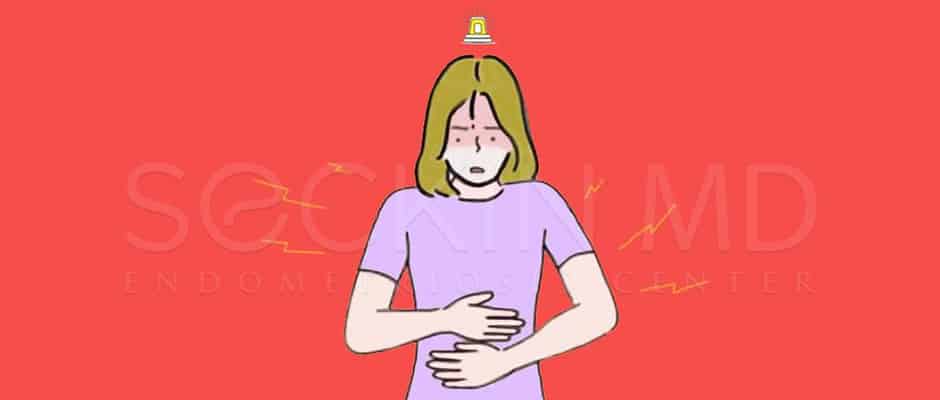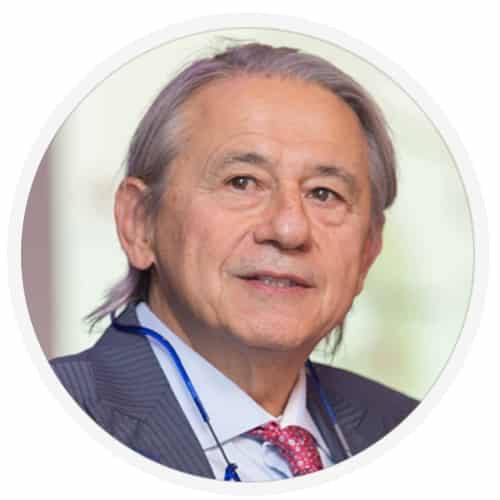Endo’s belly is a term that describes the extremely uncomfortable and severe bloating symptom specifically related to endometriosis that primary practitioners and GI doctors often dismiss and misdiagnose as IBS due to similarities in symptoms.
About endometriosis
Endometriosis is a disease where the cells that normally reside inside the uterus, making up its inner lining (the endometrium), lie outside their normal location and thus can grow on the external lining of other organs in the abdomen and pelvis, primarily female reproductive organs, and can spread or attach to other organs such as the intestines. Only laparoscopic surgery can identify these lesions.
So, the definition of endometriosis is endometrium-like tissue growing outside of the uterine cavity or as Dr. Seckin uniquely defines it, “a stem cell-orchestrated, estrogen-dependent fibrosis and inflammation in reaction to endometrial-like tissue”.
Endometriosis can be easily forgotten, dismissed, and the diagnosis delayed if the initial workup with gastrointestinal endoscopy and colonoscopy points to another diagnosis, especially if the patient mainly has GI symptoms.
The early-onset symptoms of endometriosis are:
- debilitating camps
- heavy and long periods
- painful intercourse
- nausea/vomiting
- painful bowel movements and urinary disorders
- infertility

Get a Second Opinion
Our endometriosis specialists are dedicated to providing patients with expert care. Whether you have been diagnosed or are looking to find a doctor, they are ready to help.Our office is located on 872 Fifth Avenue New York, NY 10065.
You may call us at (212) 988-1444 or have your case reviewed by clicking here.
Causes of endo belly
Endometrial-like tissue attempts to replicate the menstrual process of shedding as it is responsive to hormonal changes. However, there is no exit for the tissue. This causes inflammation, swelling, and irritation, which over time can form scar tissue.
Endometriosis can also increase water retention resulting in weight gain accompanying a bloated feeling. As a result, the inflamed tissue can cause scarring and link together further irritation and discomfort.
Other causes of a bloated belly
Other conditions may cause a bloated belly resembling an endo belly. These include:
- Crohn’s disease
- ulcerative colitis
- food allergies or intolerance
- ovarian cysts
- irritable bowel syndrome (IBS)/irritable bowel disease (IBD)
- pregnancy
Seek medical attention if you have a high fever, vomiting, bloody stools, or rapid weight loss.
Symptoms of endo belly
With an endo belly, women experience a constant feeling of pressure, gut irritation, and tightness in the lower abdominal region for varying lengths of time prior to menstruation. Irritation and inflammation can affect the gastrointestinal tract and cause symptoms of gas pain or cramps, nausea, constipation, and diarrhea.
There is a notable distinction between IBS and endo belly physically. In the endo belly, the belly chronically swells, primarily in the lower abdominal region, similar to a three-month pregnant belly that is tense to the touch.
Bowel symptoms that endometriosis patients experience
Often painful bowel movements can be problematic for endometriosis patients during or just before menstruation. Irregularities include:

- constipation
- diarrhea
- intestinal cramping when having a movement
- rectal pain or bleeding
- nausea/vomiting
Treatment of endo belly
Medical and surgical
Birth control pills may suppress the symptoms of endometriosis and maintain a balance in hormones to stabilize and halt endometriosis growth or spread. Similarly, over-the-counter pain medication can also provide some relief but can cause gastric upset.
Acupuncture may stimulate certain muscles, nerves, and tissues and may ease the endo belly.
The gold standard in treating the underlying cause of endo belly is deep-excision surgery. Treating adhesions from scar tissues on organs can help reduce complications to the bowel and endo belly. The need for adhesiolysis surgery (cutting away scar tissue) must be carefully determined with an experienced medical professional.
Gynecologists that perform endometriosis surgery are not necessarily specialists and this commonly results in laparoscopy where the procedure consists of direct burning of lesions with lasers or energy as opposed to removing the lesion entirely with deep excision using traditional surgical equipment that can have a lasting relief and is less likely to create adhesions during the healing process.
Dr. Seckin goes into grave detail about the importance of setting high standards when seeking an endometriosis specialist in his book, “The Doctor Will See You Now”.
Home remedies
Many diseases are directly linked to food and endometriosis is no exception. There is no cure for endometriosis but there are certain foods that can aid in reducing and managing symptoms such as endo belly and drastically improving overall health. Dietary changes that may reduce endo belly include:
- drinking ginger and peppermint tea to help with nausea and to provide antioxidants to reduce pelvic irritation
- avoiding caffeine as it can agitate the digestive tract, especially with endo belly
- following a Low FODMAP diet to monitor symptoms and work out which foods work best for you
- avoiding red meat as it has added hormones that can cause an imbalance
- increasing the intake of fiber to help lower absorbed estrogen from the diet
Heat pads with timers can help ease endometriosis flare-ups and endo belly by relaxing muscles. Women should use heat pads with caution and not to excess as they can cause burns and skin irritation in the long term.
Get a Second Opinion
Our endometriosis specialists are dedicated to providing patients with expert care. Whether you have been diagnosed or are looking to find a doctor, they are ready to help.Our office is located on 872 Fifth Avenue New York, NY 10065.
You may call us at (646) 960-3080 or have your case reviewed by clicking here.
Dr. Seckin is an endometriosis specialist and women’s reproductive health advocate. He has been in private practice for over 30 years at Lenox Hill Hospital with a team of highly skilled personnel.
Dr. Seckin specializes in advanced laparoscopic procedures and is recognized for his expertise in complex cases of deep infiltrating endometriosis of the pelvis. He is particularly dedicated to performing fertility-preserving surgeries on cases involving the ovaries.
He has developed patented surgical techniques, most notably the “Aqua Blue Excision” technique for a better visualization of endometriosis lesions. His surgical techniques are based on precision and microsurgery, emphasizing organ and fertility preservation, and adhesion and pain prevention.
Dr. Seckin is considered a pioneer and advocate in the field of endometriosis.
